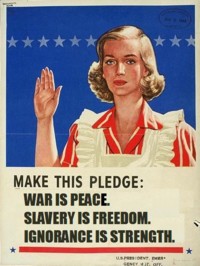A quick question about George Orwell...

...and it's not, how fucking prophetic was this guy? No, I recently read Down and Out in Paris and London (1933) by George Orwell for the first time - and I can recommend it, like most of his stuff, as a great little read to Histomat readers. I found 'Paris' far more entertaining than 'London' in Orwell's account, but that is neither here nor there really.
Anyway, to cut to the chase, it suddenly hit me, why did Orwell chose the name 'Snowball' to represent Trotsky in Animal Farm? In 1984, 'Goldstein' is clearly Bronstein - Trotsky's original surname. In Animal Farm Old Major as Marx is fairly clear (Marx was often called the 'Old Man' or 'Old Moor'), Napoleon as Stalin fits well enough for fairly obvious reasons, but Snowball? Snowball is random as fuck.
This matters to me as I chose the name 'Snowball' as a blogger. For a Marxist, Orwell's depiction of the rise and fall of the Russian Revolution in 'Animal Farm' is rather problematic due, in part, to his apparent conflation of Lenin and Stalin into one character - Napoleon - or rather the absence of a 'Lenin' character altogether. This implies Leninism led to Stalinism in a crude and ahistorical manner. Orwell's failure to acknowledge the devastating impact of the Russian Civil War is also relevant here, to say nothing of his pessimism about the possibilities of working class resistance under Stalinism. However, 'Animal Farm' is a novel - if you want to know more about the Russian Revolution read Trotsky himself as well as Tony Cliff's 'State Capitalism in Russia'.
But back to the question - why did Orwell chose the name Snowball to represent Trotsky? Was Orwell saying something about his attitude to Trotsky? Was Trotsky for Orwell a potent weapon against Stalinism but one who ultimately had melted away to nothing (as in Animal Farm)? Or was Orwell trying to say something positive about the Trotskyist movement, hoping that it would 'snowball' in size, and grow rapidly into something substantial? Anyway, answers and thoughts on a postcard to the usual address - the best response might well recieve some sort of reward...
Labels: George Orwell




3 Comments:
Good question. The only reason I could think of is somehow associating the theory of permanent revolution, and Trotsky's opposition to Socialism in One Country with the "snowball effect." Tenuous, I know, but a snowball keeps moving, gaining momentum, getting bigger - not staying in one place.
Not sure one should read that much in this name. Animal Farm is more cautionary fable than an allegory in which everything corresponds to a really existing idea or person, is it not?
Orwell was not interested in recreating the exact history of revolutionary Russia as he was in delivering a warning against stalinism. Hence the leaving out of the civil war and the abridgement of the revolution...
Incidently, I also read Down and Out in Paris and London just recently and I agree with you: Paris was more interesting than London.
Doug - yep - I think you are probably right - that makes sense. Cheers.
Martin - Animal Farm is probably more of a fable rather than an allegory, but sometimes Orwell takes care to make sure that key events in Russian history are covered. So Stalin's purges are seen in Napoleon setting the dogs on the troublesome young pigs etc etc. Hmm...
Post a Comment
<< Home